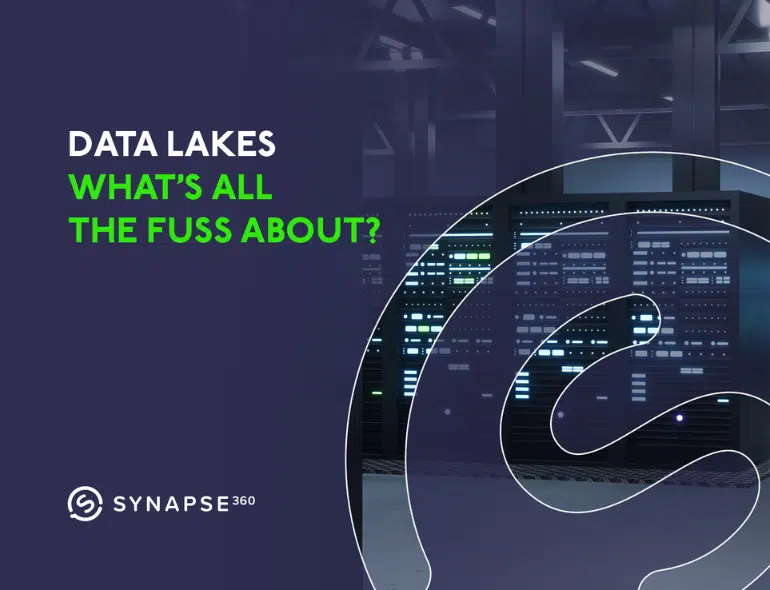It is no secret that businesses of all shapes and sizes are dealing with more volumes of data from multiple sources than ever before. To effectively manage this influx, many are turning to data lakes—a scalable and flexible solution for handling structured, semi-structured, and unstructured data. This article explores what data lakes are, their benefits and drawbacks, and how solutions like Synapse360 play a key role in modern data strategies.
What Are Data Lakes?
A data lake is a centralised repository designed to store raw data in its original format, irrespective of its structure. Unlike traditional databases or data warehouses, data lakes allow businesses to ingest massive streams of data from diverse sources without the need for immediate transformation or structuring. This means data from supply chains, customer interactions, marketing campaigns, inventory logs, and even IoT devices can flow seamlessly into the data lake.
How do Data Lakes Work?
- Storage: Data lakes leverage scalable object storage, often in the cloud, providing virtually unlimited capacity.
- Accessibility: Data remains in its raw form until needed for processing, analytics, or integration into applications.
- Metadata Tagging: Metadata helps classify and locate data assets, enabling data scientists and developers to work efficiently.
Amazon Web Services (AWS) defines a data lake as a “centralised repository that allows you to store all your structured and unstructured data at any scale. You can store your data as-is, without having to first structure the data.”
What are the Key Features of a Data Lake?
- Scalability: Cloud providers like AWS, Microsoft Azure, and Google Cloud offer virtually infinite storage capacity.
- Flexibility: Data lakes can scale up or down, aligning costs with an organisation’s needs.
- Management: Providers handle hardware, software maintenance, redundancy, and security, reducing the workload on IT and data teams.
- 4. Integration: Modern architectures often blend data lakes and data warehouses into hybrid models called data lake houses.
- Security: Cloud providers offer robust access controls, encryption, and compliance tools to meet regulatory requirements.
Pros of Cloud Data Lakes
- Cost Efficiency: Eliminates the need for capital expenditure on physical infrastructure and data centres.
- Ease of Use: Managed services reduce the burden of maintaining on-premises solutions.
- High Availability: Cloud providers ensure minimal downtime through robust redundancy mechanisms.
- Future-Proof: Ideal for AI, machine learning, and big data analytics.
- Flexible Billing: Pay-as-you-go models enable organisations to control costs based on actual usage.
Cons of Cloud Data Lakes
- Cost Escalation: Unmonitored usage can lead to unexpected expenses, particularly with data egress and downstream processing.
- Data Sovereignty: Regulations may limit where sensitive data can be stored, complicating cloud deployments.
- Control Limitations: Relying on cloud providers for infrastructure management reduces direct control.
- Security Risks: Raw, unprocessed data is often sensitive and requires stringent security measures.
Talk to Us
If you are looking to get your storage under control, a data lake could be the best option for you. Talk to our team today to see if it’s the right fit for you!



